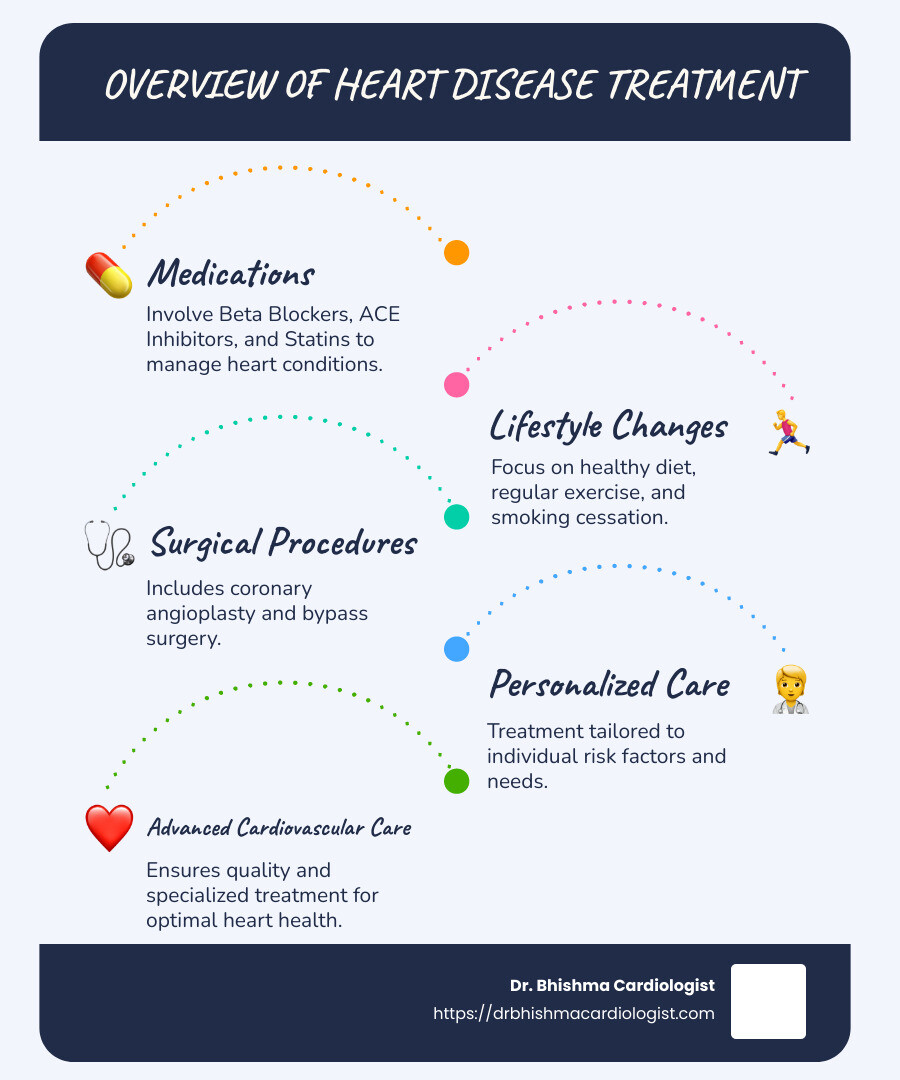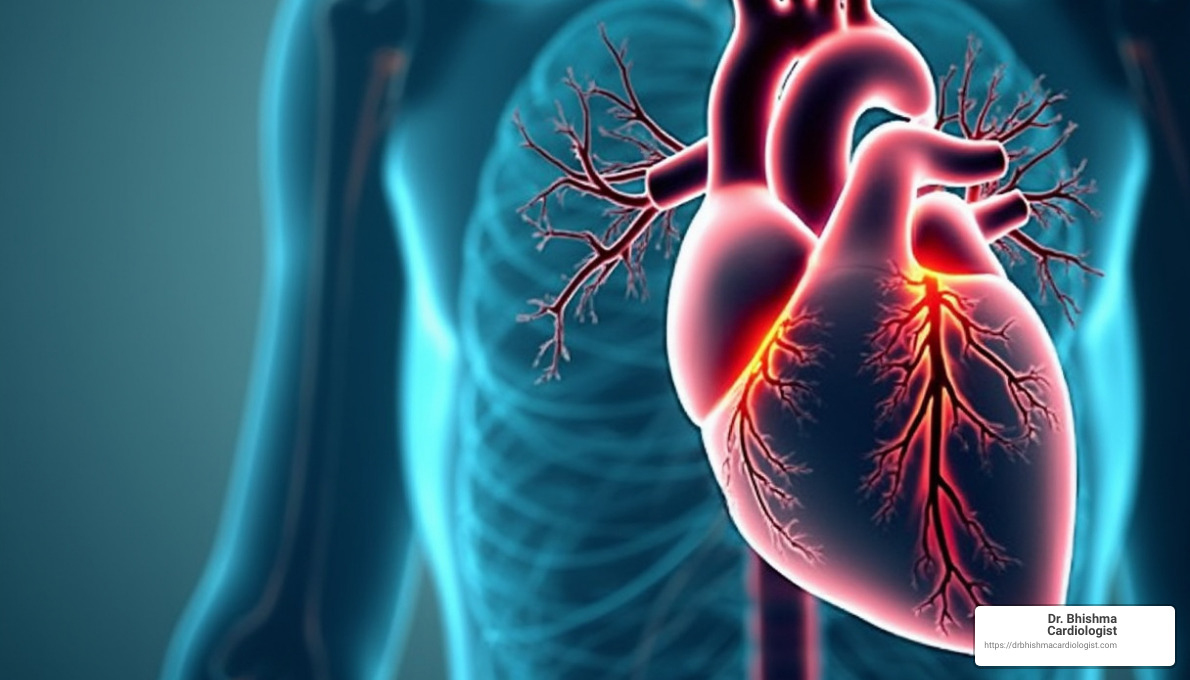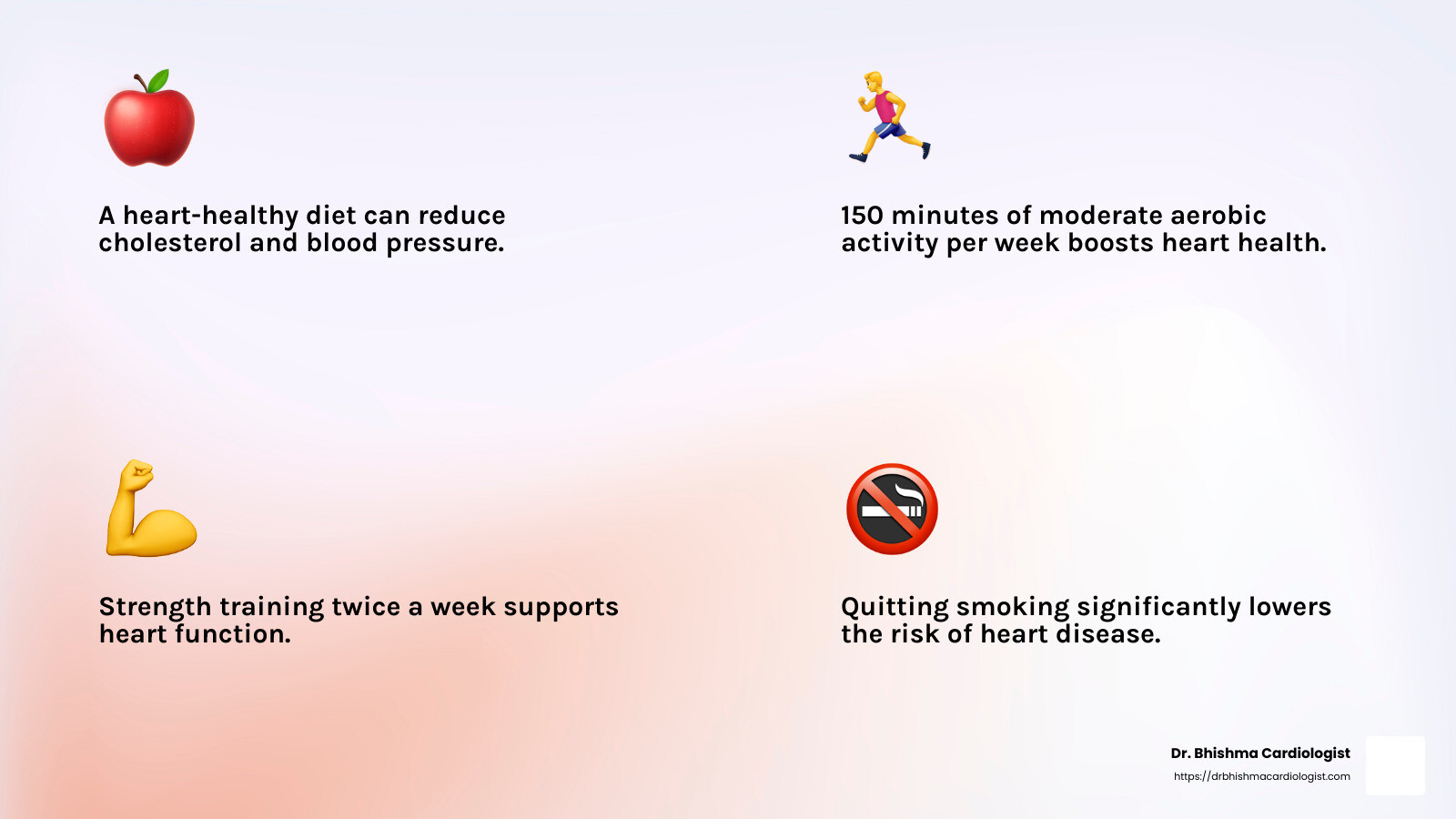Heart Disease Treatment: Your Path to Better Health

Heart disease treatment is crucial in maintaining optimal health and longevity, especially for those with a family history of cardiovascular issues like Rajesh from Hyderabad. This condition affects millions worldwide and encompasses a range of heart-related problems, including coronary artery disease, heart failure, and arrhythmias. Effective treatment options, personalized to individual needs, are essential for managing symptoms and improving quality of life.
Quick Overview of Heart Disease Treatment
- Medications: Beta blockers, ACE inhibitors, statins, and more.
- Lifestyle Changes: Healthy diet, regular exercise, smoking cessation.
- Surgical Procedures: Coronary angioplasty, bypass surgery, minimally invasive options.
- Personalized Care: Custom plans based on symptoms and medical history.
Finding a trustworthy cardiologist, like Dr. Bhishma in Hyderabad, ensures access to advanced cardiovascular care. Personalized treatment plans are key, addressing specific risk factors and needs for each patient. From lifestyle adjustments to state-of-the-art procedures, a comprehensive approach can make all the difference in heart health.

Understanding Heart Disease
Heart disease is a broad term for a range of conditions that affect the heart's structure and function. Let's explore the symptoms, causes, diagnosis, and tests associated with heart disease.
Symptoms
- Chest pain or discomfort: Often described as a feeling of pressure or squeezing, this can be a sign of coronary artery disease.
- Shortness of breath: This may occur with exertion or at rest and can indicate heart failure.
- Fatigue: Unusual tiredness might suggest that the heart isn't pumping efficiently.
- Irregular heartbeat: Feeling like your heart is skipping beats or fluttering can be a sign of arrhythmia.
- Swelling in the legs, ankles, or abdomen: Known as edema, this can indicate heart failure.
Causes
- Unhealthy diet: High intake of saturated fats, trans fats, and cholesterol can cause plaque buildup in arteries.
- Lack of physical activity: Increases the risk of obesity and related heart issues.
- Smoking: Damages blood vessels and increases the risk of heart disease.
- Excessive alcohol consumption: Can raise blood pressure and contribute to heart disease.
- High blood pressure and cholesterol: Major risk factors that can damage arteries over time.
- Diabetes: Significantly increases the risk of heart disease.
- Family history: Genetic predisposition plays a role in developing heart conditions.
Diagnosis
- Medical history and physical exam: Understanding symptoms and any family history of heart disease.
- Blood tests: Checking for proteins or markers that indicate heart damage or risk factors like cholesterol and blood sugar levels.
- Imaging tests: Such as chest X-rays to view the heart and lungs, and echocardiograms to see heart movement and blood flow.
Tests
- Electrocardiogram (ECG): Records the heart's electrical signals to detect irregularities.
- Holter monitoring: A portable ECG worn for a day or more to capture heart activity during daily life.
- Stress tests: Monitor the heart's response to physical activity, helping to identify issues not visible at rest.
- Cardiac catheterization: Uses a catheter and dye to reveal blockages in heart arteries.
- Heart CT and MRI scans: Provide detailed images of the heart's structure.
Understanding these aspects of heart disease is crucial for effective management and treatment. Early diagnosis and intervention can significantly improve outcomes and quality of life.

Heart Disease Treatment Options
Treating heart disease effectively often involves a mix of medications, lifestyle changes, and sometimes surgery or procedures. Let's break down each of these options to understand how they contribute to better heart health.
Medications
Medications play a critical role in managing heart disease. They help control symptoms, improve heart function, and reduce the risk of future complications.
- Statins: These help lower cholesterol levels, reducing the risk of plaque buildup in arteries.
- Beta blockers: These reduce heart rate and blood pressure, making it easier for the heart to pump blood.
- ACE inhibitors: These relax blood vessels, lowering blood pressure and reducing strain on the heart.
- Calcium channel blockers: These prevent calcium from entering heart and blood vessel walls, lowering blood pressure.
Lifestyle Changes
Adopting healthier lifestyle habits can significantly impact heart health and complement other treatments.
- Diet: Eating plenty of fruits, vegetables, and whole grains while limiting sugar, salt, and saturated fats is essential.
- Exercise: Regular physical activity, such as walking or cycling, can be as effective as medication in some cases. Aim for at least 30 minutes most days.
- Smoking cessation: Quitting smoking is crucial, as tobacco use is a major risk factor for heart disease.
- Stress management: Techniques like mindfulness and support groups can help reduce stress, which affects heart health.
- Sleep: Ensuring 7-9 hours of quality sleep each night supports overall well-being.
Surgical and Procedural Interventions
When medications and lifestyle changes aren't enough, surgical options may be necessary.
- Angioplasty: Also known as Percutaneous Coronary Intervention (PCI), this procedure opens blocked arteries using a small balloon and may include placing a stent.
- Coronary Artery Bypass Grafting (CABG): This surgery uses healthy blood vessels to bypass blocked arteries, improving blood flow to the heart.
- Heart transplant: In severe cases of heart failure, a transplant may be considered.
Advanced Procedures
Minimally invasive procedures have transformed heart care, offering safer and quicker recovery options.
- Transcatheter Aortic Valve Replacement (TAVR): This replaces a diseased valve without open-heart surgery.
- MitraClip Procedure: A catheter-based approach to treat mitral valve issues.
- Cryoablation and Radiofrequency Ablation: These treat arrhythmias by destroying abnormal heart tissue through a catheter.
By combining these heart disease treatment options, patients can manage their condition effectively and improve their quality of life. Transitioning into the next section, we'll explore specific medications used in treating heart disease, providing deeper insights into how they work and their benefits.
Medications for Heart Disease Treatment
Medications are a cornerstone of heart disease treatment, helping to manage symptoms and reduce the risk of further complications. Let's explore some of the most commonly used medications:
Beta Blockers
Beta blockers such as atenolol and metoprolol are often prescribed to treat high blood pressure and angina. They work by blocking the effects of adrenaline, which slows down your heartbeat and reduces blood pressure. This makes it easier for the heart to pump blood and reduces the risk of future heart attacks.
Statins
Statins are crucial for patients with high cholesterol. They help lower the production of LDL cholesterol, which reduces plaque buildup in the arteries. Common statins include atorvastatin and simvastatin. By keeping cholesterol levels in check, statins significantly cut the risk of heart attacks and strokes.
ACE Inhibitors
ACE inhibitors, like ramipril and lisinopril, are used to lower blood pressure by relaxing blood vessels. They reduce the production of angiotensin-2, a hormone that narrows blood vessels. This not only lowers blood pressure but also decreases the workload on the heart, improving overall heart function.
Nitrates
Nitrates are often used to relieve chest pain (angina) by widening blood vessels, allowing more blood to flow to the heart. Available in forms like tablets and skin patches, nitrates can have side effects such as headaches, but they are effective in providing quick relief from angina symptoms.
Calcium Channel Blockers
Calcium channel blockers, including amlodipine and verapamil, help lower blood pressure by preventing calcium from entering the cells of the heart and blood vessel walls. This relaxes and widens blood vessels, easing the heart's workload. Although mild side effects like headaches may occur, these medications are generally well-tolerated.
Each of these medications plays a unique role in managing heart disease, and a healthcare professional will tailor a treatment plan to fit individual needs. It's essential to understand how lifestyle changes can complement these medications to improve heart health.
Lifestyle Changes for Heart Health
While medications are a vital part of heart disease treatment, lifestyle changes can make a big difference in managing and preventing heart disease. Let's explore the key areas where you can take action:
Diet
Eating a heart-healthy diet is essential. Focus on:
- Fruits and Vegetables: Aim for a colorful variety to get a range of nutrients.
- Whole Grains: Choose options like oats, brown rice, and whole wheat bread.
- Healthy Fats: Include sources like avocados, nuts, seeds, and olive oil.
- Lean Proteins: Opt for fish, poultry, beans, and legumes.
- Limit Processed Foods: Cut down on salt, sugar, and unhealthy fats.
These changes help lower cholesterol and blood pressure, supporting overall heart health.
Exercise
Regular physical activity is as effective as some medications for heart disease. Aim for:
- 150 minutes of moderate aerobic activity each week, such as walking, swimming, or cycling.
- Strength training on two or more days a week.
Staying active helps maintain a healthy weight and reduces stress, both crucial for heart health.

Smoking Cessation
Smoking is a major risk factor for heart disease. Quitting can significantly improve your heart health. If you smoke, seek help to quit. Many resources and programs are available to support you through this process.
Stress Management
Chronic stress can harm your heart. Managing stress through techniques like:
- Mindfulness and Meditation
- Yoga and Deep Breathing
- Connecting with Support Groups
These practices can help lower stress levels and improve your heart's well-being.
Sleep
Getting enough quality sleep is vital. Aim for:
- 7-9 hours of sleep per night
Poor sleep can increase heart disease risk, so establish a regular sleep schedule and create a restful environment.
Incorporating these lifestyle changes can improve the effectiveness of medications and enhance your overall heart health. Next, we'll dig into the surgical and procedural interventions available for heart disease treatment.
Surgical and Procedural Interventions
When lifestyle changes and medications aren't enough to manage heart disease, surgical and procedural interventions may be necessary. Let's explore some common options.
Angioplasty
Angioplasty, also known as percutaneous coronary intervention (PCI), is a procedure used to open blocked or narrowed coronary arteries. This helps improve blood flow to the heart. During angioplasty, a small balloon is inserted into the artery and inflated to push plaque against the walls, widening the artery. Often, a stent—a tiny wire mesh tube—is placed to keep the artery open.
This procedure is typically used to relieve symptoms like chest pain (angina) and reduce the risk of heart attacks. It's a minimally invasive option with a short recovery time.
Coronary Artery Bypass Grafting (CABG)
For more severe cases of coronary artery disease, coronary artery bypass grafting (CABG) may be recommended. This surgery involves taking a healthy blood vessel from another part of the body and grafting it to bypass the blocked artery. This allows blood to flow around the blockage, improving heart function and reducing the risk of heart attacks.
CABG is often used when multiple coronary arteries are blocked. It can significantly improve the quality of life for those with severe heart disease.
Heart Transplant
In cases of severe heart failure, where other treatments have failed, a heart transplant may be considered. This involves replacing the damaged heart with a healthy donor heart. Candidates for heart transplants are typically those with end-stage heart disease who haven't responded to other treatments.
The process involves a thorough evaluation to ensure the patient is a suitable candidate and can handle the surgery and recovery. While a heart transplant is a major procedure with significant risks, it can provide a new lease on life for those with no other options.
These surgical and procedural interventions can be life-saving for individuals with severe heart disease. They are part of a comprehensive approach to heart disease treatment, custom to each patient's unique needs.
Frequently Asked Questions about Heart Disease Treatment
Can you recover from heart disease?
Yes, many people can recover from heart disease with the right treatment plan. Medications play a crucial role by helping manage symptoms and prevent further damage. Common medications include beta blockers, statins, and ACE inhibitors, which help control blood pressure and cholesterol levels.
Lifestyle changes are equally important. Quitting smoking, eating a healthy diet, and exercising regularly can significantly improve heart health. According to research, exercise can be just as effective as medication in treating heart disease.
In some cases, surgery or procedures like angioplasty or coronary artery bypass grafting may be necessary to restore blood flow to the heart. These interventions, combined with medications and lifestyle changes, can lead to a healthier heart.
What is the best treatment for heart disease?
The best treatment for heart disease varies depending on the individual and the type of heart disease they have. For many, a combination of medications and lifestyle changes is effective.
For others, surgical options like angioplasty or coronary artery bypass grafting may be necessary. In severe cases , a heart transplant might be considered. The key is a personalized treatment plan that addresses the specific needs of the patient.
Can you live a healthy life with heart disease?
Absolutely. Many people with heart disease live full, active lives. Diet and exercise are vital components of managing heart disease. Eating plenty of fruits, vegetables, and whole grains while limiting sugar, salt, and saturated fats can help keep your heart healthy.
Regular exercise not only strengthens the heart but also helps manage weight, reduce stress, and improve overall well-being. Stress management techniques like mindfulness, yoga, or joining support groups can also be beneficial in maintaining heart health.
With the right approach, including medications, lifestyle changes, and possibly surgery, you can manage heart disease and enjoy a healthy life.
Conclusion
At Dr. Bhishma Cardiologist, we are committed to providing advanced cardiovascular care that prioritizes your heart health. With over 13 years of experience, Dr. Bhishma Chowdary and our team at AIG Hospitals in Hyderabad are dedicated to delivering personalized treatment plans custom to your unique needs.
Our approach combines cutting-edge technology with compassionate care to ensure optimal heart health for our patients. Whether you're undergoing an angioplasty, managing your condition with medications, or making lifestyle changes, our goal is to support you every step of the way.
We believe that understanding heart disease and its treatment options is crucial for making informed decisions about your health. Our team is here to guide you through every aspect of your journey, from diagnosis to recovery, helping you live a healthier, more fulfilling life.
Your heart's health is our priority, and we're here to help you every heartbeat of the way.
